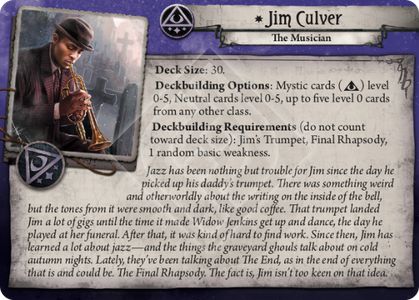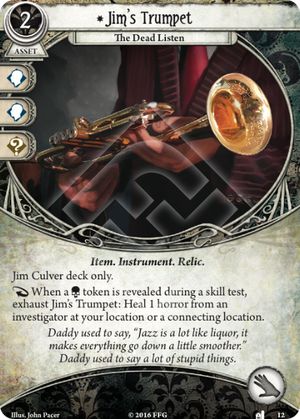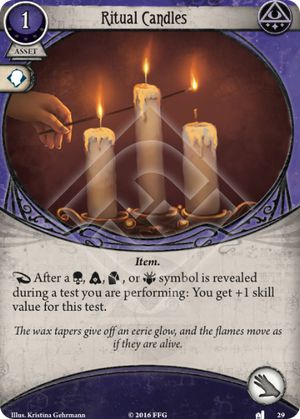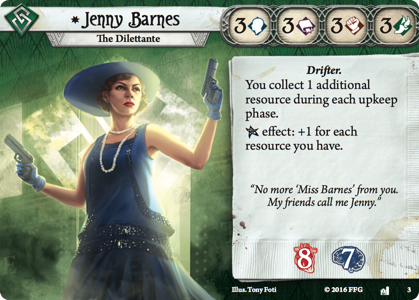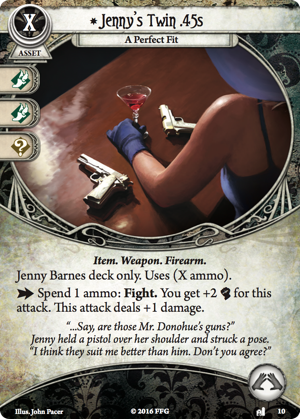Pete is one
of the guys, for whom “occupation” or "a life situation" is a more important part
of the thematic design, then the exact nature of his interactions with Mythos
(Luke, the Dreamer fits the Dreamlands theme so much better). However both the
idea of a drifter being involved in the struggle against Mythos and the strong
bond between hound and its master (taken to extreme in AH:TCG) add up to a good
playing experience.
Legacy: Pete is one of the most “classic” guys, dealing
with the Mythos ever since the base set of Arkham Horror has been released. Duke1 has been his loyal companion ever since, as well. It
seems, the design has moved towards
making the loyal dog more of an important part of Pete’s capabilities. It is
more of an all-round useful asset in Eldritch Horror, while he has two clear
uses in AH:TCG.
 |
| It seems Pete got younger since Arkham Horror times. But he for sure hasn't quit smoking. He's the Ashcan after all. |
Signature Cards/Special ability: Pete is a very unique character, who
relies on his signature card like no one else. The Arkham community is already
full of jokes describing Duke as the investigator and Pete as his asset – and
rather a weak asset, mind you. He is the central point of Pete’s design, hence
let’s start with it. Furthermore one cannot perceive Pete’s ability outside of
its relationship to his signature card, thus grouping them together.
There are three
main tasks, Arkham investigators must deal with to successfully pursue the
scenario goals. First one, is dealing with monsters (usually through fight/evade),
the other one is picking up the clues, the final one is moving between locations.
Duke has the unique quality of allowing his master to accomplish ALL OF THEM in
a much more efficient way. He can be used as a weapon, and a strong one,
attacking with base Combat of 4 (unfortunately cannot be combined with other
weapons and weapon-like assets), dealing an extra damage (key advantage, saving
actions). He can also be used to both investigate (with Intellect of 4, unmatchable by any non-Seeker investigator) and potentially move at the
same time. It creates an enormous action economy.
Two
potential problems, Pete would have to face wile using Duke are solved with his special
ability. First one seems to be a rather obvious one – Duke is of absolutely no
use nor value if he’s not in play. It is a particularly huge issue in a card
game, as the first step of playing card is drawing it in the first place.
Many decks make or break on the luck aspect of getting the necessary card
(particularly, so called combo decks)2. Luckily it is addressed by
Pete’s special ability – he already starts with Duke in play. This is a huge
advantage. Not only due to the aforementioned resolution to the luck problem.
It also makes Pete a formidable threat to the otherworldly beings (and the
evidence left by them) from the very first action.3
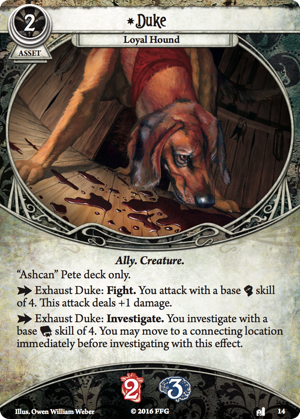 |
| Question for Savatage fans: Do you hear Duke? He calls. |
The other
issue is exhausting Duke to take advantage of his action. While both
alternatives are strong, one can use only one of them – and only once per turn (so many ones and we aim for much higher numbers!).
Here is where the second part of Ashcan's ability (yes, Pete has two special abilities!4) comes in handy.
He can discard a card to ready any asset he controls. While technically
speaking it can be used on any of his assets (and you should keep that in mind,
just in case) Duke is a very obvious (not to say: evident) choice. A card is
not a low cost, obviously, but a double use of Duke is also not a bad gain!
Please also
note, that despite bearing the “ally” trait, Duke does not take the ally (nor any other) slot .
It is
rather obvious, that Duke as a signature card has a strength far surpassing any
other signature cards. It comes at a cost of being weaker in other areas,
though.
Pete’s
Elder Sign effect might easily be the strongest one so far. Reading Duke on top
of whooping +2 bonus (yeah, I know it doesn’t matter most of the time, but still
better than 0, right?) is a huge boon. To squeeze the full benefit out of it,
try to use Duke earlier in the turn.
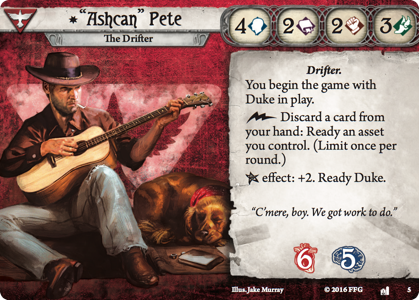 |
| Too bad Ashcan's guitar does not make an appearance. |
Pete’s
weakness might be very bad or just a minor annoyance (on par with basic
weaknesses requiring player to spend 2 actions to get rid of them). It
gets very problematic, if it comes up - and while you cannot spend the actions,
particularly if you are engaged with an enemy (it might be even a more serious
issue if you relied on the dog services to deal with the enemy).
Pete’s
cards and special ability are very thematic in two ways. First of all, they
indeed reflect the nature of a strong symbiosis between human and his trusted
animal companion. Secondly, they all orbit around a central “theme” of the
character (just like Roland and clues, Agnes and sanity/horror + spells, Jenny
and resources and so on).5 They do not bear a good link to the
Mythos world, though. The only subnatural link is created in Pete’s weakness,
which unfortunately is… not very thematic. I mean, does he have NIGHTMARES in
the middle of a scenario? He actually takes a nap? Scenarios are not really
portrayed as long journeys; they are quick events, packed within minutes/hours.
Not to mention, that one cannot find any connection between nightmares and
exhausting assets (even though it does play into the central design idea, as it
affect Duke and Pete’s ability). Or is his sleep deprivation suddenly kicking in?6
Strength
Theme
Skill values: Let’s start with a very general and important
observation – Pete’s skill values do not sum up to 12, they sum up to 11. It’s
obviously done for balancing reasons. Moreover, his total Stamina and Sanity
are very low, balanced with Stamina and Sanity of Duke, to a degree. Upon
reaching 7 damage/horror Pete is forced to discard Duke, effectively making him
7/7 (though obviously he is not defeated at this stage, though his usefulness
is HEAVILY limited).
Luckily for
Pete his weaker spots of Lore and Combat (both at 2) are mostly covered with Duke’s
capabilities. Obviously Lore and Combat are sometimes tested for other purposes
than fight or investigation actions. But they make up a bulk of all related test.
Whenever he cannot rely on hound’s competences, Pete can manage fairly well
with Agility of 3 and Will of 4. It makes him particularly resilient to most of
encounter cards, as well as invites to include spells in his arsenal. To sum
up, while the sum of his stats is low, they are distributed in a clever way,
adding up to a fairly solid set of stats.
While it
makes sense from the gameplay and balance point of view, I cannot find a
thematic explanation for a vagabond to be overall weaker than any other
investigator - including a teenage girl. Even if the choice of his weaker and stronger
sides is rather reasonable.
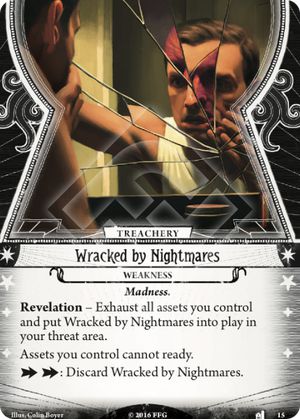 |
| Cards' illustrations have been a hit or miss for me. This is a clear miss. |
Strength
Theme
Deckbuilding/Class: Survivor cards have a very intangible
feel in common. They try to merge few mechanics/concepts – Survivors have circumstantial
cards (Fire Axe, Scavenging or newly released Newspaper), some push-your-luck/win-by-failing
stuff (absolutely powerful Lucky!, Look What I Found! or Rabbit’s Foot) as well
as few evade – related ones (Bait and Switch, Survival Instinct). Obviously
there are also some odd cards, not fitting into any of the categories; they
make the majority of all red cards, though.
You can
very well use the first two categories for when you are forced to rely solely
on Pete (up to 2 actions per turn). You are much more prone to fail such tests,
thus all the mechanics centred on failing come in very handy. So do the red
weapons. There are not designed to be
reliably used on regular basis – Baseball Bat randomly breaks, while Fire Axe
costs resources and rarely does extra damage (unless running low resources on
purpose, but it’s much more difficult than one might think). Since you are
mostly relying on Duke, they support you in case you need to spend more actions
fighting. You achieve similar goals in the investigation department with cards
like Newspaper. Scavenging comes up useful in completely opposite way - while using Duke you might manage to succeed by 2 every now and than to use the card.
The major flaw when it comes to Survivor cards is their talent - Dig Deep.
Since Pete mostly wants to fight or investigate, boosting 2 other stats does
not help too much. In fact, you should consider including 1-2 copies of other
talents in his deck.
Pete can
also take advantage, even more than other characters, of the neutral cards,
particularly the double icon skills, to help himself perform some actions on
his own.
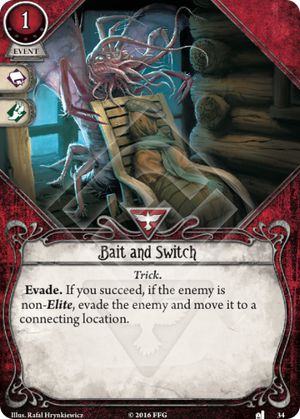 |
| While Pete can quite effectively evade as a last resort, whole group of evasion-related cars do not fit him too well. |
When it
comes to 5 non-red slots, Pete can comfortably wield spells. With Will of 4,
using Peter’s services (very useful anyway as a Sanity sink, particularly for
our vagabond due to his low resistance) and having access to Dig Deep (I know, I just criticized it a bit), he can use
Shrivelling and/or Rite of Seeking very well. Due to his high Will/Agility,
Drawn to the Flame constitutes a good way of clue-gathering. He can be customized to a degree (and even more with the recent addition of Newspaper, if
you plan to make him more of a clue gatherer), the out of class cards play a
significant role here and unfortunately he is heavily affected by the 5 card
limit.
It does
sound feasible for a tramp to potentially cross-class as he’s been to many
places and gathered a very varied set of experiences for sure. Therefore one
feels the smallest thematic disconnection (among all the Dunwich characters) when
using diverse set of cards with him.
Strength
Theme
There are
multiple factors, adding up for a huge success of AH:TCG. A very significant
one (and a one that plays a particularly big role for me) is the great job done
with making each investigator feel unique. Even among these strong individuals,
Pete clearly stands out as a very exceptional character. His strong relationship
with his animal-friend shapes the entire design of the drifter.
He can fill
all kind of roles within a team – with correctly chosen set of cards he can be
an amazingly effective fighter (who can manage investigating on a very decent
level, when no enemies are around), efficient and mobile clue gatherer
(perfectly capable of defending himself against low and medium strength
enemies) or an all-round guy. It makes him quite similar to Jim (and they both seem not to get the love they deserve within the community).
On top of
that, he is also an enormously exciting character to bring to the gaming table.
From the moment you create your deck, using him will force you to make choices.
During the gameplay, very often you have to make important calls. How to use
Duke? How to ensure you can remain operational once Duke’s exhausted (or – which
card to use to ready him)?. Same goes for assets.You will most likely try to use as few
as possible, to spend as many actions as possible actually achieving game goals (a strategy well aligned with the capabilities of the Pete-Duke duet).
You can reliably accomplish a lot just with Duke - not everything however. You have
to make trade-offs, as well as both long and short term plans. You are kept on your toes from the very
first action of the game.
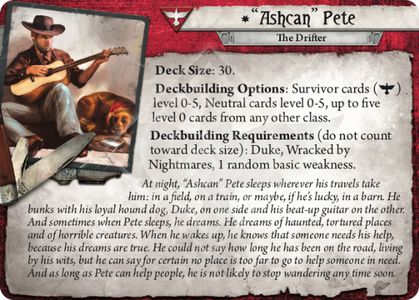 |
| Pete has no surname, just a nickname. Apparently sold it for some smokes. |
I also have
two important notes, which do not seem to fit anywhere else in this post and
that are definitely worth including here.
Firstly, surprisingly
enough, despite starting stronger than any other investigator3 (yes, 3
again), Pete does not lose much of the momentum along the game6.
He might not be able to create some abusively strong setup in the late game,
but definitely does not suddenly get inadequately weak and unable to cope with
scenario’s challenges.
I have also noticed, I am not capable of playing Pete as well as my wife, who just squeezes full potential out of this dude. It led me to a more general notion - Pete is one of the characters, who require :
1. Adapting to a specific playstyle
2. Fit with the personality in the first place. Not everyone would even want to change the way of playing to accommodate for Pete's/Duke's needs.
1. Adapting to a specific playstyle
2. Fit with the personality in the first place. Not everyone would even want to change the way of playing to accommodate for Pete's/Duke's needs.
Strength
Theme
1 Bit of the irony in the name, huh?
2It’s bit of a general point about card games in
general. Whatever we can use some general deck-typology from the general card
game lore and successfully apply it to AH:TCG remains an open question – particularly
at this stage of its life, before we’ve seen at least a sizable amount of
cards.
3Using Magic: the Gathering terminology every
Pete’s deck is an “Aggro deck”.
4And so does Jim. One might argue, it is Jim’s
Elder Sign effect having 2 benefits. Regardless of the outcome of such debate,
he has 3 abilities, where others have 2.
5It seems to be a strong point of focus for
AH:TCG designers. Many characters do have a leitmotif or at least a
relationship between their design bits (see Wendy’s amulet, used again in Elder
Sign effect and it’s interaction with her weakness). I am also planning to
write a short note about different aspects of being “thematic”.
6I know the feeling, believe me. You wake up sleepy, somehow manage to
overcome the otherworldly forces trying to suck you into the dimensional
portal known as bed. For an hour or two you manage to be fully
operational, just to suddenly succumb to irresistible sleep-curse.
7We might call it, again referencing M:tG
terminology an aggro-midrange deck.







